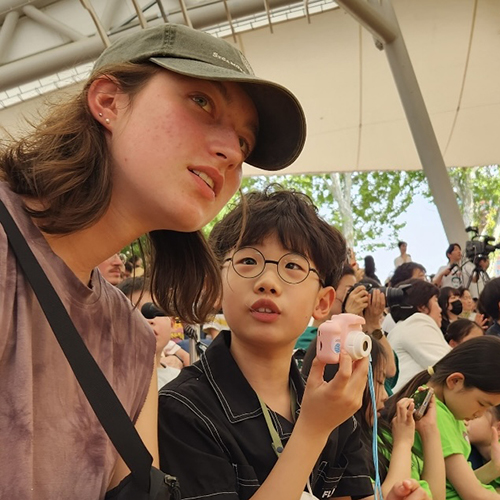Matthew Moore is an unlikely video-game designer. As a kid, he played the occasional video game at a friend’s house—his father had banned Nintendo at home—but he was more interested in Drama Club. At the UW, he struggled in an introduction to programming class, feeling more at home in literature courses. So how did Moore land a plum job as a game designer at Disney Interactive?
“It’s always been incremental,” says Moore (BA, English, 2008). “I’d follow one path and then discover another one. And having an English degree turned out to be a huge plus for me. A giant plus.”

Moore came to the UW at age 26 after earning an associate degree at Shoreline Community College and working as software trainer, salesperson, and volunteer radio DJ. He began taking courses in the English Department and found them to be a good fit.
“I took a lot of classes I really loved,” he recalls. “There were some interesting deep dives. I studied Shakespeare like everybody else, but I also took crime fiction and a class on comedy in classical English literature. I thought, ‘I’m at home here. This is where I belong.’” Moore also took a Comparative History of Ideas (CHID) course that explored video games from an academic perspective, looking at such things as how players help shape the narrative. The course would later inform Moore’s own work, but he didn’t know that at the time.
....having an English degree turned out to be a huge plus for me. A giant plus.
After graduation, a friend suggested that Moore—now a fan of video games—become a game tester at Microsoft. Moore worried that his English degree would be a detriment, but instead the hiring manager said, “You have an English degree and a background in training? You’re hired.” Moore trained new game testers and wrote reports about bugs discovered through their testing. After completing a one-year contract with Microsoft, he moved to ArenaNet as a game tester specializing in copyediting. "I scored well on their editing test," says Moore, "and that was augmented with the perception that, as an English major, I could be counted on to be good with words. I don't shy away from opportunities that are opened because of people's positive associations with my English degree."
Moore worked on ArenaNet’s Guild Wars 2, part of a series of successful online role-playing games. Before long he was hiring his own editing staff to manage a tsunami of content. But after working closely with game designers, he realized he wanted their job. “I started to get that itch,” he recalls. “I thought, ‘I want to make this game experience rather than just testing it.'” Told that he could not move into game design without prior experience, Moore spent his free time helping a friend design a mobile game for Windows phones. He was promoted to game designer soon after.

In 2014 Moore moved to Disney Interactive, where his current project is a mobile game, Marvel Avengers Alliance 2. As a content and narrative designer, he develops game scenarios and creates a guided experience for the “actors” in a scene. “I approach game design a little differently than some of my peers,” he told The Seattle Times in 2014, explaining that while most designers ask “How do we make fun?,” he instead asks, “What are we trying to convey? How will people interact with this? What will it make them think?” Moore traces this thinking back to his CHID course and the many UW English courses that stressed story, character motivation, language, and more.
“There’s the idea that if you get an English degree, what can you do with that?” says Moore. “But having a background in English is useful in a broad variety of careers, including game design, where you need to understand how stories fit together. I think most of us just have too narrow a perception of what an ‘English job’ is.”
Moore’s love of literature also spawned a recent side project, Bring Your Own Book, a low-tech game in the tradition of Apples to Apples. As the name suggests, players arrive armed with a book—anything from Infinite Jest to Complete Puppy and Dog Care. They take turns drawing prompts from a deck, then everyone races to find a phrase in their book that best satisfies the prompt. Books get passed to a neighboring player at certain points, ensuring that all players experience multiple books.
Last year Moore launched a successful Kickstarter campaign to produce a printed version of the game, which should be in stores by April. The game’s rules and prompts are already online for free download at bringyourownbook.com.
“Normally we don’t tend to think of a book as an abstract collection of words, but playing this game, you gain an affinity for the text in a new way,” says Moore, sounding every inch an English major. “Particularly for books you don’t know, it’s like opening this treasure trove. You look at the word choice in a way that I don’t think we do very often as casual readers. And then there’s the sharing aspect, seeing what books other people brought and experiencing them.”
It sounds like the perfect game for a book lover—though Moore insists there is no such thing as the perfect game.
“As game designers, we are constantly chasing not the perfect game, but the perfect game for right now,” says Moore. “Once Bring Your Own Book comes out, I’ll start looking for the next experience I can give to people. What’s the next undercurrent that needs to be brought to the surface? What’s the thing that I can make that will make people excited and happy to play? That will be my next perfect game.”
More Stories

Finding Family in Korea Through Language & Plants
Through her love of languages and plants — and some serendipity — UW junior Katie Ruesink connected with a Korean family while studying in Seoul.

Working Toward Responsible AI
Artificial intelligence (AI) is an essential tool at Indeed, a global job-matching and hiring platform. Trey Causey (2009) works to ensure that the company's AI promotes equity and fairness.

Celebrating Contemporary Indigenous Music
Markus Teuton, a musician and citizen of Cherokee Nation, explores contemporary Indigenous music through his academic work and as host of “Indigenous Jazz,” a radio show.